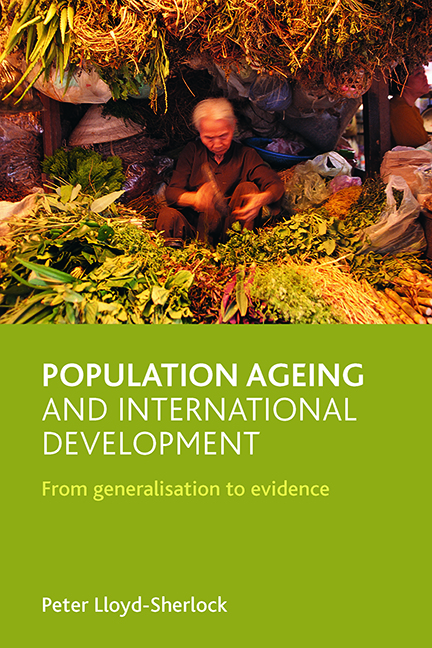Book contents
- Frontmatter
- Contents
- List of abbreviations
- Acknowledgements
- Notes on the author
- Introduction
- one International development and population ageing
- two Experiencing later life in contexts of development
- three Older people, pensions and development
- four Population ageing and health
- five Later life and social relations: family, migration and care
- six Ageing and development in South Africa
- seven Ageing and development in Argentina
- eight Ageing and development in India
- nine Conclusions and overview
- References
Introduction
Published online by Cambridge University Press: 15 July 2022
- Frontmatter
- Contents
- List of abbreviations
- Acknowledgements
- Notes on the author
- Introduction
- one International development and population ageing
- two Experiencing later life in contexts of development
- three Older people, pensions and development
- four Population ageing and health
- five Later life and social relations: family, migration and care
- six Ageing and development in South Africa
- seven Ageing and development in Argentina
- eight Ageing and development in India
- nine Conclusions and overview
- References
Summary
The number of people aged 60 and over is projected to increase by one and a quarter billion between 2010 and 2050, reaching 22% of the world's total population. Of these, 81% will be living in Asia, Africa, Latin America or the Caribbean (United Nations Population Division, 2008). What will this mean for the world and what will old age mean for these people?
In April 2009, as part of a larger study, I interviewed two older women living on the same street in Cape Town, South Africa. Both were aged in their early sixties and both received a basic pension from the government. The first woman I interviewed was paralysed and bed-bound, having suffered a series of strokes. She was depressed and gave a confused account of her life and experiences. She had been frequently hospitalised and was dependent on her immediate family to meet her care needs and keep her spirits up. The second woman was in good health and had a positive outlook on life. She helped care for several grandchildren, ran errands for other family members and was a regular church-goer.
These contrasting experiences of later life are not unusual. Instead, they are typical of the huge diversity of situations faced by older people around the world. Despite this, discussions about population ageing and the lives of older people are often framed by a number of stereotypes and generalisations. These include:
• Population ageing is ‘problematic’ for development.
• The situation faced by older people across developing countries is broadly similar. For example, it is often claimed that the vast majority of older people in these countries experience poverty, vulnerability and withdrawal.
This book contends that:
• Population ageing must be seen as an integral part of development, rather than an external threat to it.
• Processes of development are complex and highly variable, giving rise to diverse patterns of population change.
• At the same time, complex and variable processes of development lead to diverse experiences of later life.
• Population ageing can affect most aspects of development, but these effects will be significantly modified by how later life is experienced.
- Type
- Chapter
- Information
- Population Ageing and International DevelopmentFrom Generalisation to Evidence, pp. viii - xiiiPublisher: Bristol University PressPrint publication year: 2010



